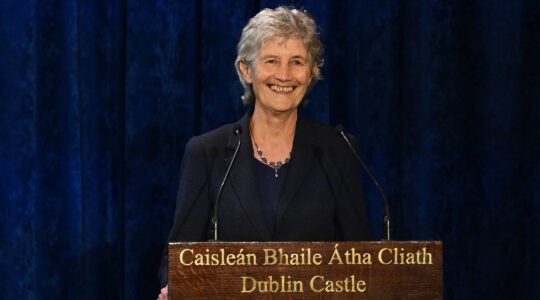(JTA) — Belgium’s Flemish Region will impose new limitations on the ritual slaughter of animals without stunning in 2019.
Ben Weyts, the animal welfare minister of the Flemish Region — one of three autonomous states that make up the federal kingdom of Belgium – made the announcement Wednesday in the Flemish parliament. The new limitations would be launched on Jan. 1, 2019.
Their precise nature has not yet been made public nor finalized pending talks with representatives of the Jewish and Muslim communities, the Gazet van Antwerpen daily newspaper reported Thursday.
Weyts, commenting on criticism by some Jews and Muslims in Belgium over the announcement, told the newspaper that “the decision in principle has been taken and everyone should respect it.”
Neither the elected representatives of the Jewish community of the Flemish Region nor of those of Belgium have consented to the plan to impose new limitations, which Weyts described as a “compromise” and “historical agreement.”
Contrary to some reports in the media, the Flemish parliament did not vote on a ban, according to the De Morgen daily.
The plan to introduce the new limitations was announced as the result of an agreement between the coalition partners of the center-right New Flemish Alliance ruling party.
Pinchas Kornfeld, an influential rabbi from Antwerp who acts as spokesman for the region’s communities and is chairman of the European Shechitah Board, would not comment on the details of the proposed limitations, the Joods Actueel Jewish paper reported.
Shechitah, the ritual method of slaughtering animals, requires they be conscious when their throats are slit — a practice that critics say is cruel but which advocates insist is more humane than mechanized methods used in non-kosher abattoirs. Muslims slaughter animals in a similar method, albeit with fewer restrictions, to produce halal meat.
According to Joods Actueel, Weyts is seeking the consent of Muslim and Jewish faith communities to a proposal in which small animals would be non-lethally stunned with electricity before they are killed. Larger animals would receive “irreversible stunning” — a term that usually describes a bolt pin to the brain — within seconds of the slashing of their throats in a procedure known as post-cut stunning. Some Orthodox Jewish communities and their faith leaders, including in Austria, have accepted post-cut stunning.
Kornfeld declined to comment on the proposal.
“We will study it calmly and then react,” he told Joods Actueel.
The European Jewish Association, a Brussels-based lobby group, condemned the announcement, which the group said amounted to a ban on the practice.
“Let’s stop pretending that banning kosher slaughter has anything to do with animal welfare,” said the group’s leader, Rabbi Menachem Margolin, who is affiliated with the Chabad Hasidic movement. It is “dubious, unsettling and running contrary to [scientific] evidence.”
His association said the government of Belgium’s Walloon Region is planning to announce a similar plan next year.
Antwerp, the capital of the Flemish Region, has 18,000 Jews, roughly half of the Jewish population of Belgium. The city’s kosher slaughterhouses provide meat to many Jewish communities in Europe.
JTA has documented Jewish history in real-time for over a century. Keep our journalism strong by joining us in supporting independent, award-winning reporting.





